10 Great Scenes from Shakespeare Plays
A List

I am a person who adores Shakespeare. I have posters of him in my bedroom, I have his plays in beautiful editions and, oh yeah, I teach Shakespeare Plays too. The way I became interested in Shakespeare was fairly strange. I remember watching Ian McKellan's Macbeth and then Ben Whishaw's Hamlet then basically thinking to myself 'what?' and 'how?' I was shocked at the sheer amount of energy given into these performances, and as the curious nine-year-old I was, I wanted to find out more. Over the years, I became more and more enamoured by Shakespearean Verse, going on to read all of the plays attributed to him (yes, and 'The Arden of Faversham' even though it is not technically canon). And as someone who is now in their mid-20s, I can honestly say that I have spent a good portion of my life researching, studying, re-reading and critiquing the work of the bard.

On my degrees, I studied Shakespeare so intensely, I felt like I may have just drowned in all my research, I found books that people had written about Shakespearean plays that were fiction too. Carrying on a story, offering a different perspective and all of them were so interesting to see. A personal favourite of mine within that realm has to be Howard Jacobson's "Shylock is My Name" based upon "The Merchant of Venice". It was incredible to see the discussion of identity out of the story of the play.
When it comes to performances, I have acted in and seen my fair share on stage and critiqued, reviewed and researched from the screen. I have to admit it has been a very difficult process to come to this, but regardless of their interpretation - the next ten Shakespearean Scenes are timeless classics of the bard demonstrating his greatest pieces of dialogue, writing and the creation of drama.
10 Great Scenes from Shakespeare Plays

10. Julius Caesar - Act 3, Scene 1

When I first read "Julius Caesar" off my own accord during secondary school, I have to say that this was the version of events I took for the death of the Roman Emperor. The way Shakespeare writes this scene in which the other characters attack Caesar and famously stab him to death on the Ides of March (15th March), is absolutely amazing. Just take a look at this line:
"People and senators, be not affrighted; / Fly not; stand stiff: ambition's debt is paid."
This is a line said by Brutus just after he has stabbed Caesar and the Roman Emperor has only just offered up the most famous line in the play 'Et tu, Brute...' It is a fantastic perspective on why Brutus planned the assassination of and killed Caesar - for principal.
9. Hamlet - Act 2, Scene 2
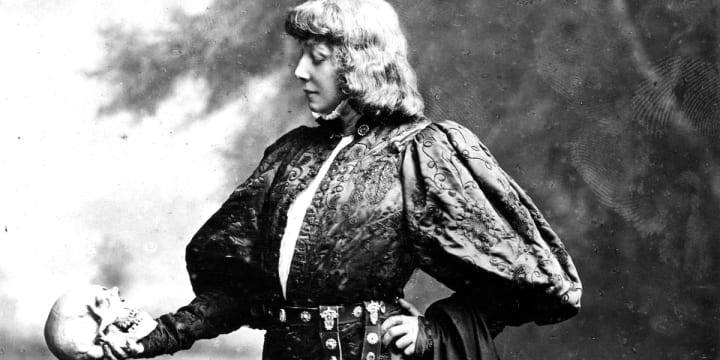
Honestly, I could have chosen every single scene from this play if I really wanted to and apart from the famed 'to be or not to be' scene, this is possibly one of the most iconic Shakespearean scenes to ever grace the stage mainly because of its well-written soliloquy by Hamlet at the end of it. Act 2, Scene 2 concerns Hamlet getting actors ready to perform something in front of his uncle, it will be called 'The Murder of Gonzago' and depicts the murder of Hamlet's father by his uncle. Hamlet explains this in the soliloquy but there are some lines in that speech that send shivers straight down you. Such as this one:
The spirit that I have seen
May be the devil: and the devil hath power
To assume a pleasing shape; yea, and perhaps
Out of my weakness and my melancholy,
As he is very potent with such spirits,
Abuses me to damn me: I'll have grounds
More relative than this: the play's the thing
Wherein I'll catch the conscience of the king.
When Hamlet talks about the 'spirit' he is of course, talking about the ghost of his father - the 'spirit' assuming a 'pleasing shape' is therefore something he recognises. Hamlet's depression makes him weak for such spirits and the question arises that if he knows this - why does he do nothing to stop himself. As with Brutus, for Hamlet it was never about the power - it was about the principal.
8. Richard III - Act 3, Scene 3
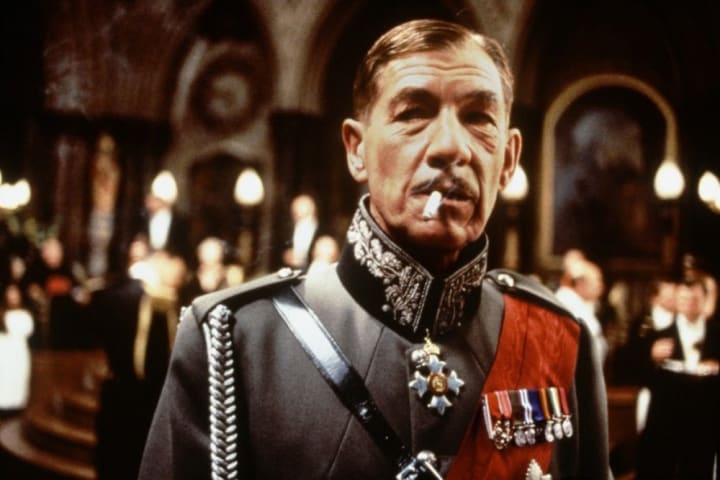
Richard III is one of my all-time favourite Shakespeare plays and some of the lines and speeches, the back and forth dialogue in the form of an argument, is some of Shakespeare's best political work in my opinion. However, the best scene in this play is when Rivers, Grey and Vaughan are imprisoned and due to be executed in Pomfret Castle and Rivers utters the closing likes to the scene which are just perfect for the dark, nightly and still but eerie atmosphere in which these three men who have done nothing wrong, must meet their deaths:
"Come, Grey, come, Vaughan, let us all embrace: / And take our leave, until we meet in heaven."
Though left out of many performances due to people thinking that it is an unimportant scene, the characters of Lord Rivers, Grey and Vaughan are quite interesting in the way they politically wedge together. If you want to see this in further action then I suggest checking out the 1995 adaptation of Richard III starring Sir Ian McKellan as the King, and as Rivers we have Robert Downey Jr. (who meets his end in the play in a very different way indeed).
7. The Merchant of Venice - Act 4, Scene 1
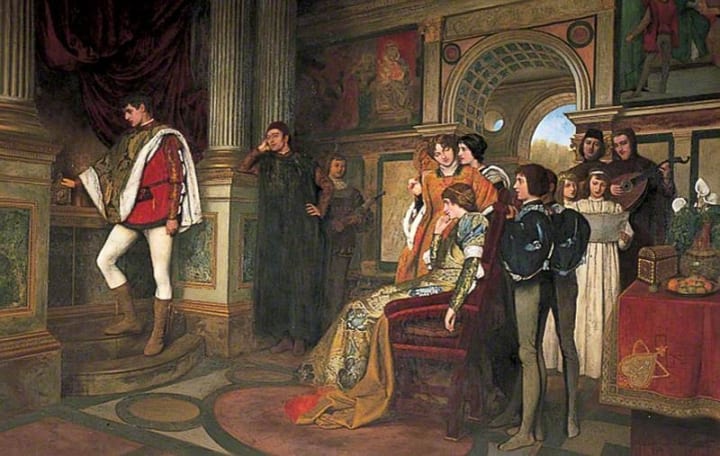
As we know, in Shakespeare plays, Act 4 Scene 1 is normally the point at which some serious stuff will happen. In "Hamlet" Claudius complains of his 'heavy deed' in front of Gertrude, in "Richard II" the King 'gives away [his] crown...' and in "Macbeth" - the three deadly apparitions and the line of kings appear as the witches form for a final time. In "The Merchant of Venice" though, it is the 'trial scene' of the play in which Antonio's fate is in the hands of a Machiavellian court structure - a scene which has had its meaning changed due to circumstance and historical viewpoint. The back and forth nature of the speech between Bassanio and Shylock is something that has always felt so engaging to me. But it will always be the speech that the 'judge' (actually just Portia in drag) gives that will haunt the audience:
"The quality of mercy is not strain'd,
It droppeth as the gentle rain from heaven
Upon the place beneath: it is twice blest;
It blesseth him that gives and him that takes:
'Tis mightiest in the mightiest: it becomes
The throned monarch better than his crown..."
This is because the main theme of the entire play is in fact, the quality of mercy. The judgements made in this courtroom basically change the entire meaning of the play and history, academic viewpoints and criticisms on identity have changed them for us once again.
6. Measure for Measure - Act 4, Scene 3
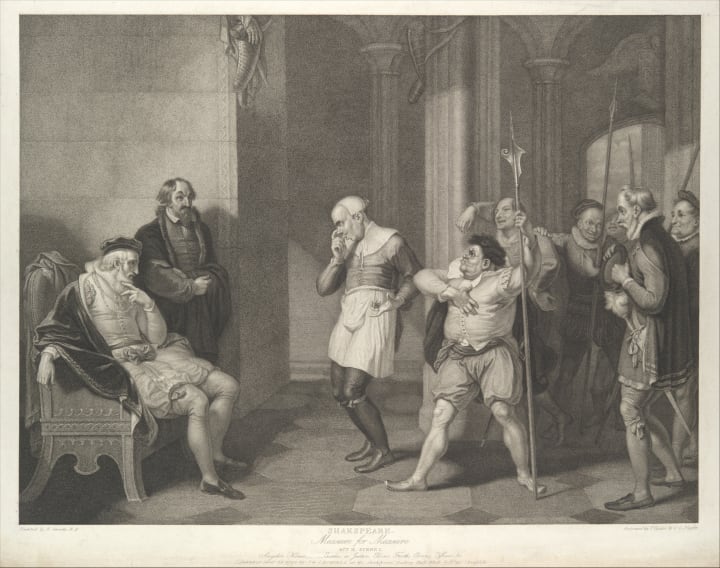
I'm not going to lie, but I am quite the fan of "Measure for Measure" when it comes to people playing tricks on other people. The Duke is disguised as another man (note: disguise is one of Shakespeare's favourite things to do in the comedies) and makes conversation with a man called the Provost about how he is going to teach a man a good lesson and how he is also going to deal with Claudio's situation of being in jail. But, when the Provost exits the scene, we get some darkness come from the mouth of the man who is supposed to be the Duke of the city, a man who left Angelo in charge:
Now will I write letters to Angelo,—
The provost, he shall bear them, whose contents
Shall witness to him I am near at home,
And that, by great injunctions, I am bound
To enter publicly: him I'll desire
To meet me at the consecrated fount
A league below the city; and from thence,
By cold gradation and well-balanced form,
We shall proceed with Angelo.
It is like the wolf's toothy grin come out from beneath the shadows. We gain access to plans in Shakespeare plays via characters exiting the scene and one character, alone with their thoughts in soliloquy. In my opinion, this is such a great and thorough scene because it sets up the 'happy ending' which when you think about it - is not really happy at all. I remember seeing this scene performed live by a young Shakespeare group (probably younger than myself) and it was brilliant.
5. The Taming of the Shrew - Act 5, Scene 2
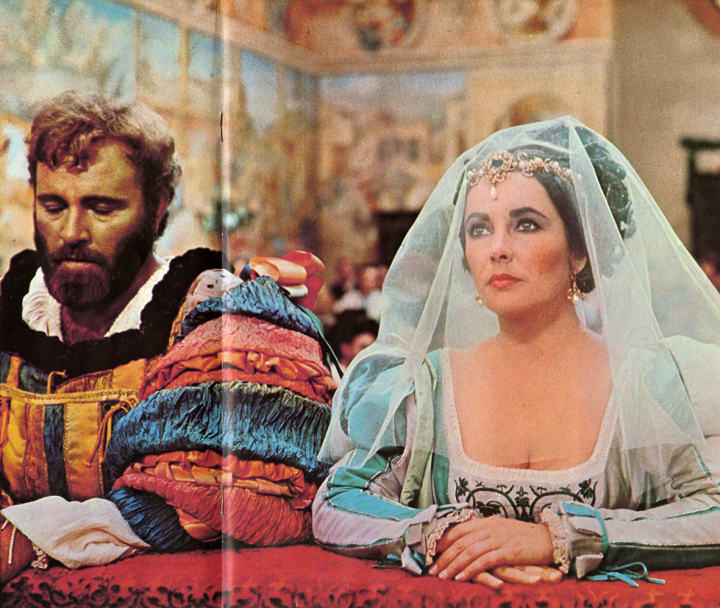
Often considered to be a 'happy ending' to the play, there is something really off about the ending to "The Taming of the Shrew". At a moment in Act 5, Scene 2, Petruchio and his friends make a wager to see which of their wives is more obedient and Petruchio calls the once 'shrewish' but now 'tamed' Katherina over to demonstrate and hopefully, win the bet. Here is what he says, to which she complies to:
"Katherine, that cap of yours becomes you not:
Off with that bauble, throw it underfoot."
This is only moments before the widow interrupts to stop this objectification of Katherina. But, Katherina takes the reins to give a speech about how she is now 'tame'. I think this is Shakespeare making the best attempt to actually make fun of his audience for believing that this would happen in real life - even in his own time. Now, he just makes fun of us all over again. This would never happen this way. Not at all.
4. Macbeth - Act 5, Scene 5
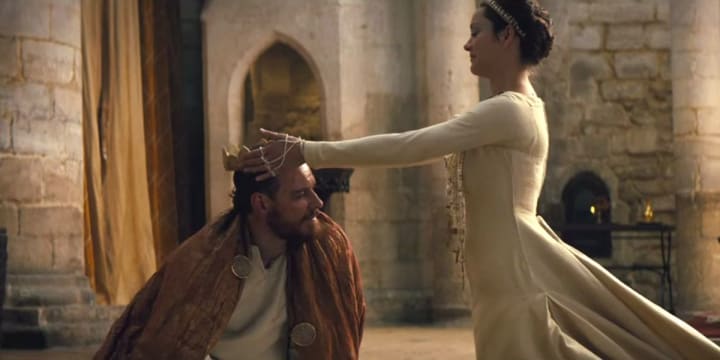
Normally not the one people would chose for the best scenes of Shakespeare, but this scene I feel is underrated and important to the rest of the play. After the death of Lady Macbeth and now realising that he can and may actually be defeated as the 'apparitions' start to become a physical manifestation of reality - Macbeth gives one of his angriest speeches which, if it doesn't put fear into your veins, then question whether you really understand what he just said:
If thou speak'st false,
Upon the next tree shalt thou hang alive,
Till famine cling thee: if thy speech be sooth,
I care not if thou dost for me as much.
(...)
Ring the alarum-bell! Blow, wind! come, wrack!
At least we'll die with harness on our back.
Macbeth is speaking to the Messenger who is just relaying information but threatens to hang the Messenger alive if any bit of information is even slightly off and starve him to death. Then he ends the speech by stating that even if the weather turns against him, he will die in his armour - and so, boldly and bravely. This is Macbeth at his most murderous and vengeful, an entirely different man who chickened out of killing King Duncan when the witches told him the first prophecy. The character development is astounding.
3. 12th Night - Act 5, Scene 1
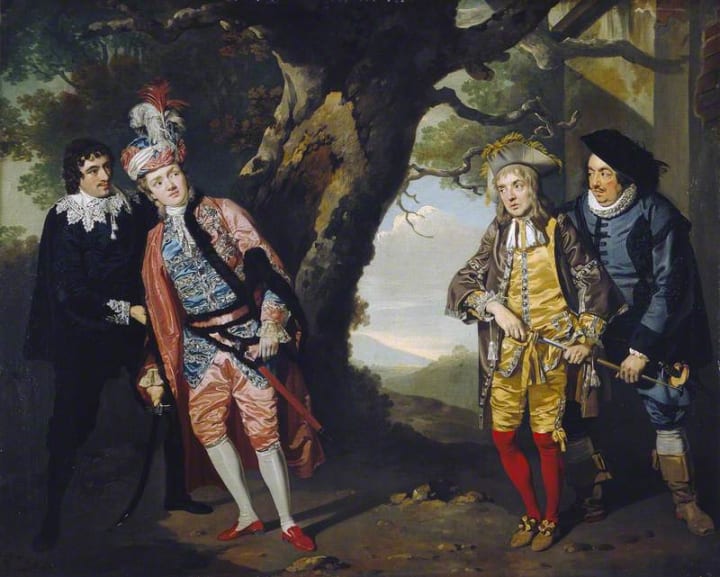
I have always been fascinated by the character of Feste and how he quite literally marks the end of the festivals leading up to the 12th night. Feste is a brilliantly complex character because he has very little impact upon the events of the storyline other than to tell us where the story is going and often to serve as the 'fool' character (that is if Malvolio isn't available - I couldn't stop laughing at that guy). At the end of the play, Feste sings a song that closes the play and it goes like this:
When that I was and a little tiny boy,
With hey, ho, the wind and the rain,
A foolish thing was but a toy,
For the rain it raineth every day.
(...)
A great while ago the world begun
With hey, ho,
But that's all one, our play is done,
And we'll strive to please you every day.
There is something about this song which is slightly off when you see it performed on stage and yet, that is the entirely the point. The song is supposed to sound a bit silly, but it is also supposed to be a bit off - as if everything is not really resolved. The question of Malvolio is still open and the drunk uncles are still around. There are many questions left unanswered and that is the point. If you think that the ending with the coupling resolved things then Shakespeare has fooled you, my friend.
2. Titus Andronicus - Act 2, Scene 4
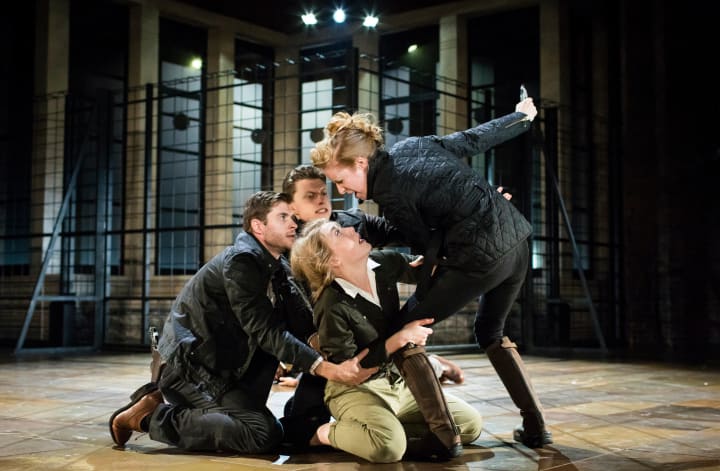
We all have to admit that there is a very good reason why "Titus Andronicus" is not taught in schools and a lot of those reasons manifest in the brutality of the play. The next reason is because of Act 2, Scene 4 - the ravishing scene. This is the first time we really see the damage that this play can do - Lavinia has been 'ravished' (a calmer word for a different crime). Demetrius and Chiron took Lavinia to the forest and after the deed is done, they cut off her hands so she cannot point at them and cut out her tongue so she may not speak and thus, name them. It's a horrible thing that Demetrius says after the act:
She hath no tongue to call, nor hands to wash;
And so let's leave her to her silent walks.
They're just going to leave her without a tongue and without hands - simply bleeding from these places and in silence. She cannot even call for help. It is probably one of the saddest scenes in all of Shakespeare.
1. Richard II - Act 4, Scene 1
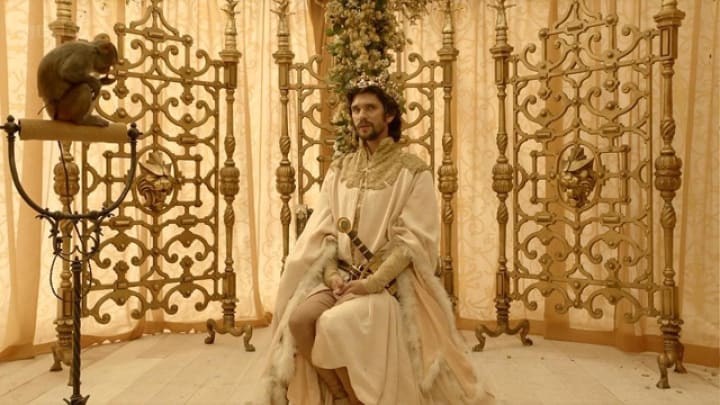
I think we can all admit that this is one of the most incredible scenes that Shakespeare ever wrote. It is one of those that every time it is performed, just makes you cry because it is so good. Richard II has lost his little battle with Henry Bolingbroke who comes back to reclaim his stuff after his father, John of Gaunt, died and Richard took all of the inheritance for the Irish Wars. Bolingbroke accuses the King of England of breaking the laws concerning inheritance and therefore, the King has an uprising against him. King Richard II is deposed and King Henry IV instilled as King. The deposition scene is one of the single greatest pieces of writing in English History. Here is King Richard II resigning the crown:
I give this heavy weight from off my head
And this unwieldy sceptre from my hand,
The pride of kingly sway from out my heart;
With mine own tears I wash away my balm,
With mine own hands I give away my crown,
With mine own tongue deny my sacred state,
With mine own breath release all duty's rites:
All pomp and majesty I do forswear;
My manors, rents, revenues I forego;
My acts, decrees, and statutes I deny:
God pardon all oaths that are broke to me!
God keep all vows unbroke that swear to thee!
Make me, that nothing have, with nothing grieved,
And thou with all pleased, that hast all achieved!
Long mayst thou live in Richard's seat to sit,
And soon lie Richard in an earthly pit!
This speech is not just upsetting to witness, but it is an oath of death. Richard II is so depressed that he has been deposed that he asks for death to come to him in the last line of this extract. This soliloquy really represents that finally, after everything from anger and washing his hands in the soil, to the sadness of digging his own grave - King Richard II has finally given up.
If you want to watch possibly the greatest performance of this play ever from "The Hollow Crown" - then check out the link for the deposition scene.
About the Creator
Annie Kapur
200K+ Reads on Vocal.
English Lecturer
🎓Literature & Writing (B.A)
🎓Film & Writing (M.A)
🎓Secondary English Education (PgDipEd) (QTS)
📍Birmingham, UK




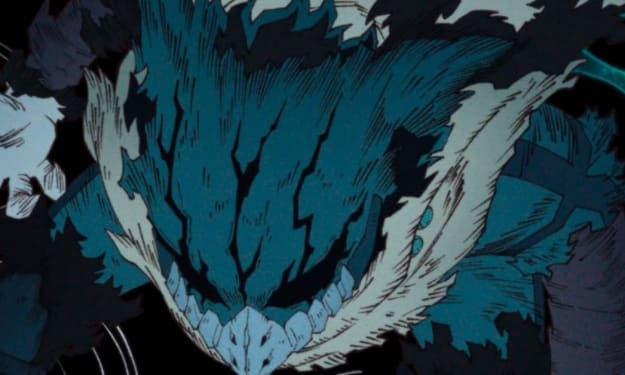

Comments
There are no comments for this story
Be the first to respond and start the conversation.